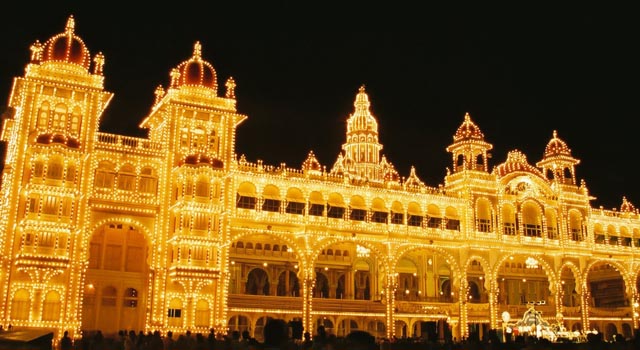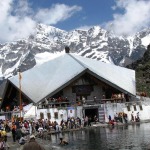One of the grandest royal buildings of India is Mysore Palace. It is the top choice for visiting when you go to Mysore, sometimes referred to as the Heritage City Mysuru. This excellent palace was the former seat of the Wodeyar Maharajas and was destroyed by a dreadful fire in 1897. The present-day palace was constructed in 1912 by a famous English architect, Henry Irwin. It was priced at Rs 4.5 million then.
The architectural style of Mysore Palace is hybrid and depicts a mixture of various architecture schools. It presents a kaleidoscope of stained glass design with Indo-Saracenic marvel. The flashy colors of the mirrors create a surrealist mood as you go inside the palace. Embellished by carved wooden doors and regal mosaic floors, the palace holds in all its glory the charm. The paintings depicting life in Mysore during the Edwardian Raj era add to the ambiance. A fine collection of sculptures and artifacts are for the public. Also, the armory collection with 700-plus weapons will intrigue anyone with or without an interest in history.
Hundreds of tourists visit the palace during any weekday. It is one of the busiest tourist spots during Christmas, of which about 15% are international tourists. Barring the national holiday and Sunday, from 7 pm to 7.45, the palace glows with nearly 100,000 bulbs. You can experience the best majestic charm. You can take pictures of the palace’s exterior; however, photographing the interior is strictly prohibited.
Mysore Palace: A Hub of Cultural Significance
Beyond its architectural marvel and historical artifacts, Mysore Palace holds profound cultural significance for the people of Mysore and all of India. It symbolizes pride and identity, embodying the grandeur of a bygone era. The palace is not just a tourist attraction. It is a cherished heritage site that resonates with the collective memory of a nation.
For the people of Mysore, the palace is not just a relic of the past. It is a living testament to their rich cultural heritage. It is a constant reminder of the enduring legacy of the Wodeyar dynasty and their contributions to the region’s development. The annual celebration of the Dasara festival, a prominent Hindu festival, further underscores the palace’s significance. During Dasara, the palace is beautifully adorned, and a grand procession featuring caparisoned elephants, traditional dancers, and musicians winds its way through the city streets, culminating at the palace. This vibrant celebration is a testament to the enduring cultural traditions that the palace represents.
The palace also plays a vital role in promoting tourism and cultural exchange. International tourists are drawn to its splendor, and in return, the city of Mysore benefits from increased revenue and exposure. The palace is a cultural bridge connecting people worldwide to India’s rich history and heritage. It fosters an appreciation for India’s diverse culture and traditions. It is the best destination for travelers seeking an authentic cultural experience.
A Glimpse into Royal Life
Visitors to Mysore Palace are not just treated to architectural beauty and historical artifacts. They also get a rare glimpse into the opulent lives of Indian royalty. The palace’s opulent interiors are a testament to the lavish lifestyles of the Wodeyar maharajas. The intricately decorated ceilings, ornate chandeliers, and lavish furnishings transport you to a time when extravagance knew no bounds.
The palace’s numerous rooms and halls tell a different story, offering visitors a multifaceted experience. The Diwan-e-Aam (Hall of Public Audience) is where the maharaja held meetings with the public and received their petitions. On the other hand, the Diwan-e-Khas (Private Audience Hall) was reserved for more intimate gatherings and discussions.
One of the most captivating rooms in the palace is the Kalyana Mantapa (Marriage Hall). This exquisitely adorned hall was the venue for royal weddings and ceremonies. The hall is adorned with stained glass ceilings, intricate frescoes, and gilded columns, creating an atmosphere of unparalleled grandeur. It’s easy to imagine the splendor and joy filling this hall during royal celebrations.
Mysore Palace: A Lesson in Preservation
Preserving a historic monument like Mysore Palace is no small feat. The authorities responsible for its upkeep face the constant challenge of balancing preservation with accessibility. The delicate windows, the priceless paintings, and the ornate wooden carvings require meticulous care and maintenance.
Efforts are also made to maintain the palace’s structural integrity. Regular inspections and restoration work are carried out to prevent deterioration. The goal is to keep the palace as close to its original form as possible so that future generations can continue to admire its beauty.
A Timeless Gem
Mysore Palace is more than just a building. It is a living, breathing testament to India’s rich history, culture, and architectural heritage. It is a place where the past meets the present, where luxury and artistry come together to create an unforgettable experience. Whether you are a history enthusiast, an architecture buff, or simply a traveler seeking to immerse yourself in the cultural tapestry of India, Mysore Palace offers a journey through time that is both enriching and awe-inspiring.
As you leave the palace grounds, you carry with you not just photographs and memories but a deep appreciation for the legacy of the Wodeyar Maharajas and the vibrant cultural heritage of Mysore. Mysore Palace stands as a beacon, reminding us of the beauty and significance of preserving our history and heritage for generations. So, if you ever find yourself in the Heritage City of Mysuru, step into this timeless gem and be prepared to be captivated by the magic of Mysore Palace.
Tourists can explore the interiors of Mysore Palace. However, photography and videography are strictly prohibited inside the palace to protect its delicate artifacts and decor.
Yes, Mysore Palace is famous for its grand celebration of the Dasara festival, one of India’s most significant Hindu festivals. During Dasara, the palace is beautifully illuminated, and a grand procession featuring caparisoned elephants, traditional dancers, musicians, and cultural displays takes place.
Mysore offers a rich blend of cultural, historical, and natural attractions. Some of the must-visit places in Mysore include Mysore Palace, Chamundi Hill and Temple, Brindavan Gardens, St. Philomena’s Church, Mysore Zoo, and the Railway Museum.







You must be logged in to post a comment.